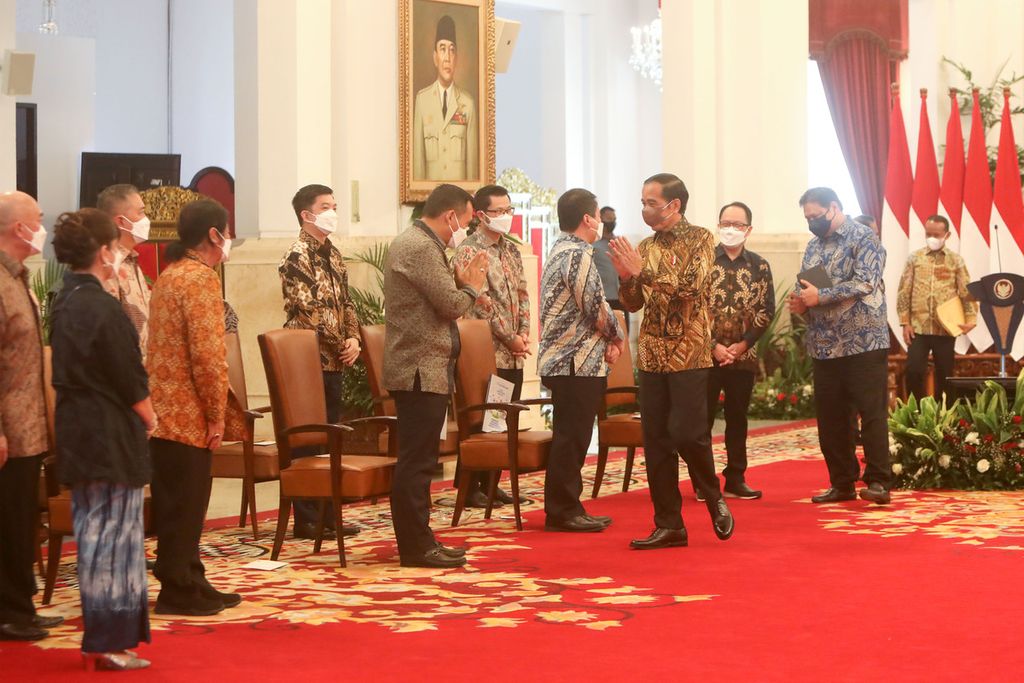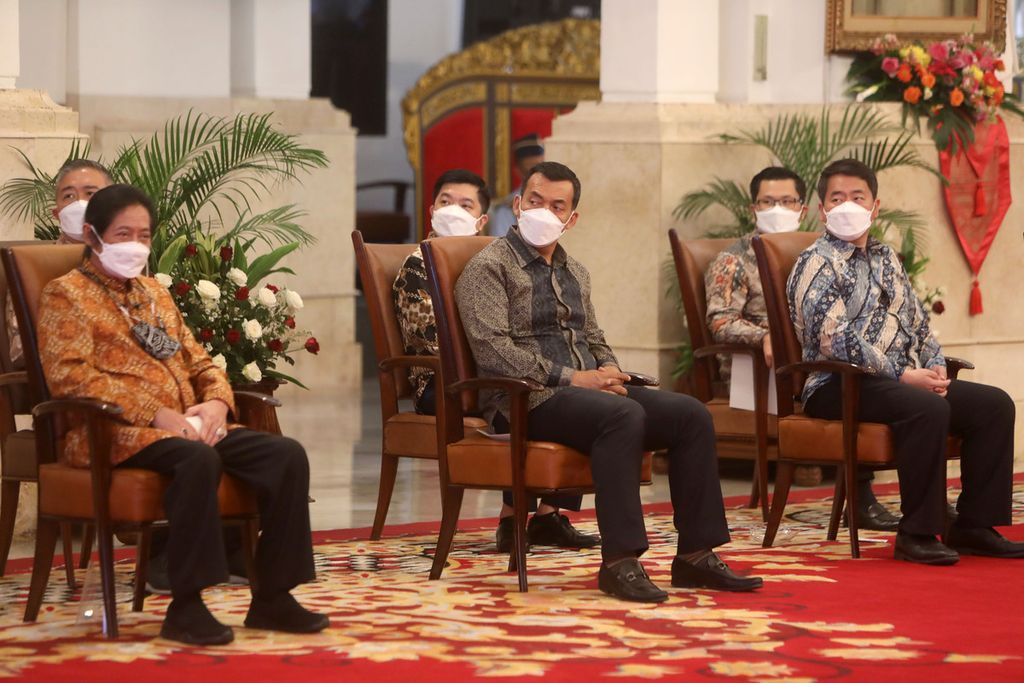Spur New Economic Transformation
A total of 24 CEOs were in the audience at the palace. As many as 41 other CEOs attended the live broadcast of the forum at the Jakarta Convention Center, while more than 300 participants followed the event online.

President Joko Widodo talks with CEOs after being keynote speakers at the 12th Kompas100 CEO Forum by East Ventures at the State Palace, Jakarta, Thursday (18/11/2021).
Indonesia has a limited window of time to transform into a green and digital economy. Only by succeeding in its Covid-19 mitigation measures can the country spur its readiness to keep pace with the green and digital movement sweeping the globe.
JAKARTA, KOMPAS — Indonesia needs to transform into the green and digital economy of the global mainstream. Accelerated transformation will help contribute to the nation's future progress. Strict control of the Covid-19 pandemic is imperative to ramp up the pace of transformation.
"The most important thing, in my opinion, is that 2022 has just one key: we can control Covid. That is the key. If we cannot control it, the economy will decline and slump again," President Joko Widodo said on Thursday (18/11/2021), speaking at the Kompas100 CEO Forum Powered by East Ventures at the State Palace in Jakarta.
Also read:
> Standardization of-Sustainable Business Urged
> Resurgence of Covid-19 Pandemic
> It’s Time to Empathize with the People
Accompanying the President were Coordinating Economic Minister Airlangga Hartarto, State Secretary Pratikno, Investment Minister/Investment Coordinating Agency (BKPM) head Bahlil Lahadalia, and Kompas Gramedia CEO Lilik Oetama.
A total of 24 CEOs were in the audience at the palace. As many as 41 other CEOs attended the live broadcast of the forum at the Jakarta Convention Center, while more than 300 participants followed the event online.
Emphasizing that Covid-19 control was requisite for economic growth, the President called for sustained efforts to maintain the positive trend, as shown by a number of health indicators, by practicing discipline in handling the pandemic.
/https%3A%2F%2Fkompas.id%2Fwp-content%2Fuploads%2F2021%2F11%2F48213129-a5ac-48c9-abbb-2bff6a32ae57_jpg.jpg)
BNI President Director Royke Tumilaar (left) and Kalbe Farma CEO Vidjongtius during the Kompas100 CEO Forum "Healthy Economy 2022" which was held hybridly at the State Palace and Jakarta Convention Center (JCC), Jakarta, Thursday (18/11/2021).
Progress in Covid-19 mitigation would accelerate Indonesia’s readiness for economic transformation. The President also raised the matter of developing into a green and digital economy.
"We are headed toward what is called the green economy. We have great resources in this respect, and we have to start working out a strategy," he said.
The green economy has increasingly become part of the global agenda since early this month, when the United Nations Climate Change Conference (COP26) was held in Glasgow, Scotland.
The COP26 countries declared their commitment to reducing their carbon emissions in order to keep the earth's temperature below an average increase of 1.5 degrees Celsius compared to pre-industrial levels.
The participating countries are expected to gradually reduce their output of greenhouse gases (GHG), including through their consumption of goods and services, to finally achieve net zero emissions.
"In 2030, Europe and the United States may no longer receive products (from economic activities) that use fossil energy. They will draw up an ordinance on this. At the G20, it was the leading topic," said President Jokowi.
Resource-rich Indonesia
The President appeared to be optimistic about Indonesia’s capacity to develop a green economy, citing its huge potential. He said the country had 128 large rivers and 4,272 medium-sized rivers across the archipelago.
Among the large rivers is the Kayan River in North Kalimantan, which has electricity-generating potential of 11,000-13,000 megawatts (MW). The Mamberamo River in Papua has the potential to produce 24,000 MW of electricity. Indonesia also has massive potential in geothermal, marine and wind energy.
“This is our strength that we must recognize and immediately make use of it for the future of the generations to come. This is the strength we want to tap into," he said.

CEOs of several companies participated in the 12th Kompas100 CEO Forum by East Ventures at the State Palace, Jakarta, Thursday (18/11/2021).
The President also touched upon the digital economy. Indonesia currently has 2,229 start-ups with huge market potential. The potential of the domestic digital economy by 2024 is estimated at US$124 billion, or approximately Rp 1.76 quadrillion.
"We must be ready for it. I am targeting two years (to prepare the road map). If we miss [this target] in the next two years, we will be overtaken by other countries. Therefore, we must have a road map," he said.
A green and digital economy will provide great opportunities for the business sector. One of the government’s initiatives is the development of the Green Industrial Park in North Kalimantan.
While urging the business sector to capitalize on the opportunities in the digital economy, the President pointed to the potentials in digital infrastructure, such as fiber optics, microwave links, satellites, and data centers.
"We have to move quickly. If not, other countries will take [advantage of] it. Believe me. We have only two years to prepare. Pick up the pace,” the President said.
This would require multiple policies and instruments, she said, and the process would run slowly if efforts were not pushed ahead.
At the Kompas100 CEO Forum session that was held at the Jakarta Convention Center, Finance Minister Sri Mulyani Indrawati said that the government was committed to pushing the transition to a green economy. This would require multiple policies and instruments, she said, and the process would run slowly if efforts were not pushed ahead.
In terms of financing, Sri Mulyani called on the international community to discuss the green economy more openly. "Don't put the burden on my [Indonesian] taxpayers," she said.
The Finance Ministry notes on its website that Indonesia has targeted reduceing GHG emissions by 2030 by 29 percent under a “business as usual” scheme and by 41 percent with international assistance.
The country’s priority sectors are forestry, energy and transportation, which account for 97 percent of the total emissions reduction target.
Indonesia’s latest green report notes the country’s ambition to achieve net zero emissions by 2060 or earlier.
Sri Mulyani said the transition to a green economy would require gradual implementation and a smooth path. “If the world becomes too extreme, coal and fossil fuel will increase. There must be transition. It is very complicated, but it has to start," she said.
Golden opportunity
During the same session, Airlangga hailed the period of transition as a golden opportunity that would be decisive for Indonesia in making efforts to accelerate economic growth.
"If we can get past the first curve, economic growth acceleration can be encouraged in January," he said.
/https%3A%2F%2Fkompas.id%2Fwp-content%2Fuploads%2F2021%2F11%2Fe81d2b77-a598-4112-a666-e0eab4c5692e_jpg.jpg)
Vice President Director of PT Pan Brothers tbk Anne Patricia Sutanto at the Kompas100 CEO Forum "Healthy Economy 2022" which was held hybridly at the State Palace and Jakarta Convention Center (JCC), Jakarta, Thursday (18/11/2021).
The curve that Airlangga referred to were the upcoming Christmas and New Year year-end holidays, with the awareness that long holidays were usually followed by an explosion in Covid-19 cases.
Most recently, the Idul Fitri holiday season led to second wave of Covid-19 infections in Indonesia. From late May to early September 2021, the country recorded 2.5 million new cases and 94,455 deaths.
Health Minister Budi Gunadi Sadikin highlighted that the pandemic response could not be implemented in just one sector alone, but across major sectors, such as public health and the economy.
"The combination of the throttle and brake [scheme] will work well. The driver must be skilled and possess good judgment, knowing when to apply the throttle and when to apply the brake. In the future, the throttle and brake are expected to work better,” said Budi.
Emphasizing the role of the pharmaceutical industry in transforming Indonesia’s health system, he said the government planned to provide factory development incentives from the upstream to hte downstream.
The government would also encourage the procurement of domestic health goods and services. (CAS/DIM/AGE/TAN/BKY/LAS)
(This article was translated by Musthofid).